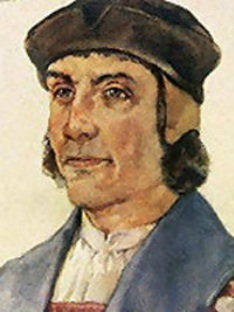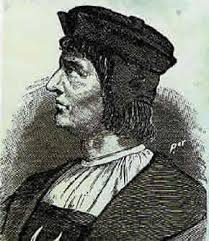| Bartolomeu Dias | |
|---|---|
 |
|
| Nobleman | |
| Specialty | Exploration |
| Born | ca. 1451 Algarve, Kingdom of Portugal |
| Died | May 29, 1500 Cape of Good Hope |
| Nationality | Portuguese |
Bartolomeu Dias born in 1451 and he became a Portuguese nobleman and explorer. He was the sailing master of the man-of-war Saint Christopher from 1487 and 1488. He also led a three-ship expedition that made the first recorded rounding of the southern tip of Africa.
Dias’s Work
Very little is known of Bartolomeu’s life before the year 1487. The only thing known about him is that he was at a court of Joao II, the King of Portugal, between 1455 and 1495. He was also the superintendent of royal warehouses. In 1846, when he was in his late 30s, Joao appointed him to lead an expedition to search for a sea route to India.
Joao was sent to go out with two explorers. The three were to look overland for a Christian kingdom located in Ethiopia. Joao also wished to find a route around Africa’s southern coast. Just few months after the overland explorers were went out, he decided to sponsor Dias in one African expedition.
Sailing around Africa
In August of 1487, Dias’ trio of ships took off from port of Lisbon in Portugal. He followed a route of Diogo Cao, a 15th century Portuguese explorer. Diogo had followed this African coast as far as Cape Cross in Namibia. His expedition party included six Africans that had earlier been brought to the land of Portugal by some earlier explorers.
He dropped the Africans at various different ports just along the African coastline. He left them with supplies of silver and gold from the Portuguese to all the indigenous communities. The last two Africans were dropped at a place that Portuguese sailors had named Angra do Salto (now Angola). The expedition’s supply ship was actually left there under a guard of nine men.
South African Expedition
In the early part of 1488, Dias’ two ships were sailing off the coast of South Africa. Storms had pushed them away from coast. Dias then ordered the ships to turn south at 28 degrees because he had known of the southeasterly winds that helped him around the tip of Africa.
This also helped him keep the ships from getting dashed on rocky shoreline. Joao and other people had already obtained navigational intelligence that included one 1460 map all the way from Venice showing the Indian Ocean on the other side of the African continent. They found one bay and named it Sao Bras (now Mossel Bay).
Making the Right Decision
 The decision made by Dias was very risky, but it worked. The team spotted landfall on February 3, 1488, about 300 miles on the eastern side of Cape of Good-Hope. This bay had warmer waters compared to the rest of the Indian Ocean. From this shoreline, the Khoikhoi pelted all the Dias ships with stones. This continued until one arrow fired by Dias felled a tribesman.
The decision made by Dias was very risky, but it worked. The team spotted landfall on February 3, 1488, about 300 miles on the eastern side of Cape of Good-Hope. This bay had warmer waters compared to the rest of the Indian Ocean. From this shoreline, the Khoikhoi pelted all the Dias ships with stones. This continued until one arrow fired by Dias felled a tribesman.
Bartolomeu Dias decided to venture further along this coastline. However, his crew was very nervous about the reducing food supplies and therefore urged him to return. As mutiny loomed, he appointed a council to work on the matter. All the council members agreed that they would let him sail three more days and then turn back.
Naming Some Provinces
At Kwaaihoek (now the Eastern Cape Province), the team planted a padrao on March 12, 1488. This marked the easternmost point of the Portuguese exploration. On his way back, Dias crossed the southernmost point of Africa, now called the Cape of Needles. He named the rocky second cape Cabo das Tormentas because of the strong storms and Atlantic and Antarctic currents which made the ship travel perilous.
A Disaster for Dias
In Angra do Salto, Bartolomeu and his team was devastated to find out that only three of the nine men left to guard their food ship had made it. After being in the sea for 15 months and having traveled a journey of about 16,000 miles, the mariners were actually met by some triumphant crowds. Despite his great achievements, Dias was never given another position of authority.
Working with Vasco da Gama
After his expedition, Dias decided to settle in Guinea in the western part of Africa. Here, he served as a consultant for an expedition of the famous Vasco da Gama. He sailed with the Vasco expedition all the way to the Cape Verde Islands and then went back to Guinea. The ships reached their main goal getting to India in May of 1498. Later, Dias captained four ships that reached Brazil in 1500. The crew then headed across the Atlantic towards South Africa. Unfortunately, their journey was cut short in May of 1500 when four ships were wrecked due to the notorious storms. The entire crew was lost at sea, including Dias.